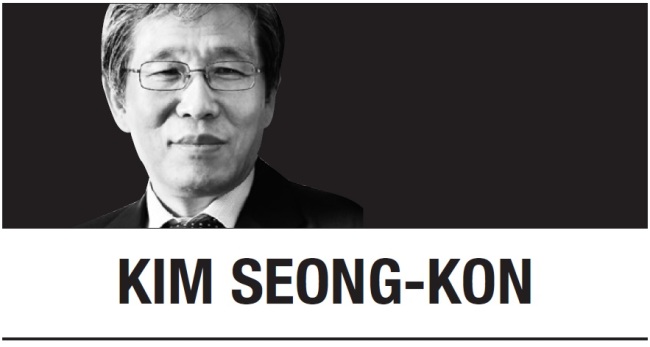[Kim Seong-kon] The second-coldest winter: Seoul in 2018
By Kim Seong-konPublished : Dec. 26, 2017 - 17:48
 The UN soldiers who fought in the Korean War will remember the unbearably cold weather on the Korean Peninsula at the time. During the Jan. 4 Retreat, for example, numerous UN soldiers, especially those from warmer climates, died from the severe cold weather in North Korea. It is not a coincidence that the title of Pulitzer Prize winner David Halberstam’s book on the Korean War is “The Coldest Winter: America and the Korean War.”
The UN soldiers who fought in the Korean War will remember the unbearably cold weather on the Korean Peninsula at the time. During the Jan. 4 Retreat, for example, numerous UN soldiers, especially those from warmer climates, died from the severe cold weather in North Korea. It is not a coincidence that the title of Pulitzer Prize winner David Halberstam’s book on the Korean War is “The Coldest Winter: America and the Korean War.”
In the book, Halberstam reveals that the United States was not at all interested in Korea at that time. According to him, Washington decided to intervene in the Korea War solely to protect Japan, not Korea.
The book states that Japanese political leaders thought that, geopolitically, the Korean Peninsula would be like a dagger pointing at the throat of Japan if it turned into a communist country backed by the Soviet Union. Washington was obliged to protect Japan from this imminent threat.
To the Americans, however, the Korean Peninsula would not be a threat to their country at all, even if it turned communist. In 1949, Gen. Omar Bradley, chairman of the Joint Chiefs of Staff, even described Korea as a place of no strategic value.
Therefore, dream on, old Koreans, who naively but firmly believe that Washington will never pull its troops from South Korea because of Korea’s invaluable strategic value. And wake up, young Koreans, who frivolously assume that the deployment of US troops in Korea is solely for the sake of America’s national interests.
Another reason for the US’ participation in the Korean War was Washington’s concern about the expansion of communism in East Asia. Initially, the US government thought it was Stalin who instigated and manipulated the Korean War. Later, however, it turned out that it was Kim Il-sung’s idea and Stalin initially hesitated to approve it. Unlike the ungrounded propaganda of anti-American radicals, the Korean War was not a proxy war of the United States and the Soviet Union. Rather, it was essentially a war between the two ideologically different factions, the North and the South.
Halberstam’s aforementioned book also states that when the North Korean troops invaded, South Korean soldiers were not ready to fight back at all. While the North was armed with more than 100 fighters and 150 tanks, South Korean troops had virtually nothing, except for a few outdated M-1 rifles and anti-tank guns that were useless against the sturdy Soviet-made T-34 tanks. To make matters worse, Halberstam writes that numerous South Korean soldiers deserted when the war broke out, and many officers, though brave, were still corrupt opportunists who took bribes and appropriated military budgets.
Halberstam also points out that the only ray of hope for South Korea in the face of aggression from North Korea, China, Japan and the Soviet Union, was a faraway country called the United States. Indeed, who could deny that South Korea was saved by American intervention? And who could possibly deny that Korea has been economically prosperous thanks to the support and assistance from the US? In the eyes of North Korea, therefore, America is the archenemy that deflated its dream of unifying the peninsula under the communist flag. Hence, we understand why anti-American sentiment is so pervasive in North Korea.
North Korea does not seem to have given up the scheme of establishing a unified communist country on the peninsula. It is well-known that North Korea’s main purpose of developing nuclear missiles is not so much to attack the US as to unify the Korean Peninsula. Experts say that the North Korean threat to the US is ultimately aimed at making America sign a peace treaty and withdraw its troops from South Korea. North Korea seems to believe that if that happens, it could easily take over the South with its nuclear weapons.
Sixty-seven years have passed since the Korean War. Today, South Korea has become an affluent society with cutting-edge technology and economic affluence. Once again, however, the second-coldest winter seems to be approaching the peninsula, freezing everything we have accomplished. The difference is that this time, no UN troops will come to our rescue. We will have to endure the second-coldest winter alone this time.
In his short story “Seoul: 1964, Winter,” novelist Kim Seung-ok brilliantly depicts the bleak and desolate landscape of Korean society during the military dictatorship and rapid industrialization of the 1960s. If he has to write a similarly grim story to portray Korean society in 2018, it would be heartbreaking and devastating. What in the world have we done for the past 67 years? Why should we go back to repeat our dark past again? I cannot but help shudder at this scenario because living in a communist country will surely be as terrifying as living under military tyranny.
In the new year, I hope South Korea can overcome the cold winter and greet a warm spring.
By Kim Seong-kon
Kim Seong-kon is a professor emeritus of English at Seoul National University and president of the Literature Translation Institute of Korea. He can be reached at sukim@snu.ac.kr. -- Ed.


![[Exclusive] Korean military set to ban iPhones over 'security' concerns](http://res.heraldm.com/phpwas/restmb_idxmake.php?idx=644&simg=/content/image/2024/04/23/20240423050599_0.jpg&u=20240423183955)
![[AtoZ into Korean mind] Humor in Korea: Navigating the line between what's funny and not](http://res.heraldm.com/phpwas/restmb_idxmake.php?idx=644&simg=/content/image/2024/04/22/20240422050642_0.jpg&u=)




![[Graphic News] 77% of young Koreans still financially dependent](http://res.heraldm.com/phpwas/restmb_idxmake.php?idx=644&simg=/content/image/2024/04/22/20240422050762_0.gif&u=)
![[Herald Interview] Why Toss invited hackers to penetrate its system](http://res.heraldm.com/phpwas/restmb_idxmake.php?idx=644&simg=/content/image/2024/04/22/20240422050569_0.jpg&u=20240422150649)




![[Exclusive] Korean military to ban iPhones over security issues](http://res.heraldm.com/phpwas/restmb_idxmake.php?idx=652&simg=/content/image/2024/04/23/20240423050599_0.jpg&u=20240423183955)



![[Today’s K-pop] Ateez confirms US tour details](http://res.heraldm.com/phpwas/restmb_idxmake.php?idx=642&simg=/content/image/2024/04/23/20240423050700_0.jpg&u=)